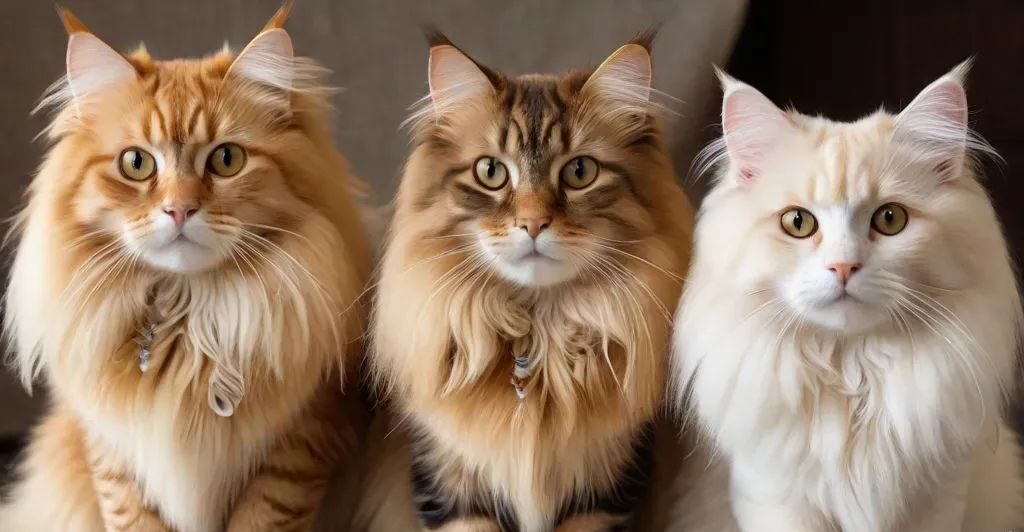
10 Fascinating Facts About Domestic Long Haired Cats You Need to Know!
What Are Domestic Long Haired Cats?
Domestic long-haired cats are cats with long, beautiful fur. They are not a specific breed but a mix of different breeds that have long hair. People love them for their gorgeous looks and friendly nature.
Brief History and Origin
Characteristics of Domestic Long Haired Cats
Physical Appearance
Domestic long haired cats have:
- Thick, long fur in many colors and patterns.
- Bushy tails.
- Large, bright eyes.
- Strong bodies with sturdy legs.
Personality Traits
These cats are:
- Affectionate: They love being with their owners and enjoy cuddles.
- Playful: They like playing with toys and games.
- Intelligent: They learn quickly and can be trained.
- Independent: They enjoy attention but also like spending time alone.
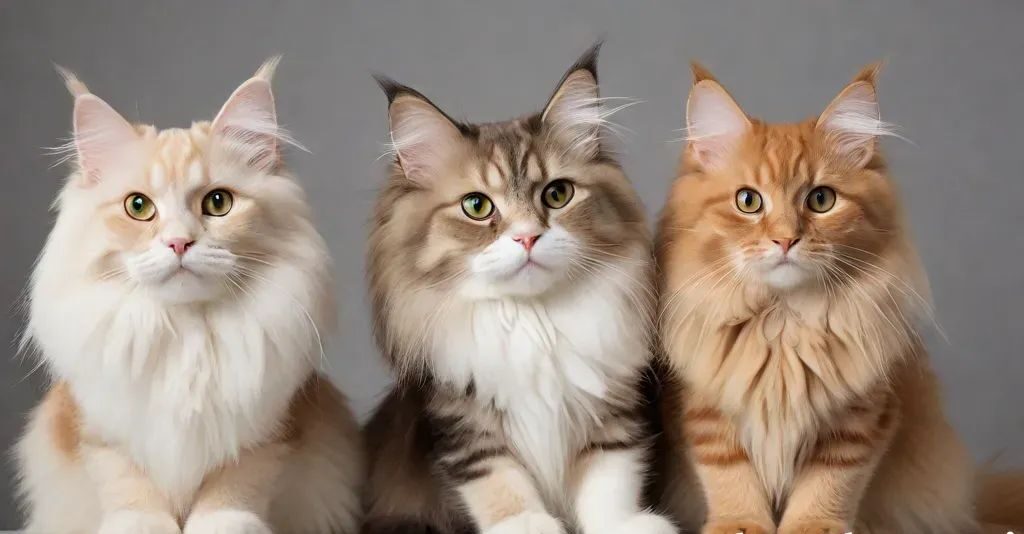
Popular Breeds of Domestic Long Haired Cats
Maine Coon
Maine Coons are big, friendly cats with a shaggy coat. They are known as “gentle giants” and are great with families and other pets.
Persian
Persians have round faces and long, dense fur. They are calm and loving, making them perfect lap cats. They need a lot of grooming.
Ragdoll
Ragdolls have striking blue eyes and silky fur. They are named because they go limp when picked up. They are very gentle and affectionate.
Siberian
Siberians are from Russia and have a dense, water-repellent coat. They are playful, smart, and friendly. They are also known to be hypoallergenic.
Caring for Domestic Long Haired Cats
Grooming Needs
Regular grooming is important to prevent their fur from getting tangled. Brush them a few times a week to keep their fur in good shape.
Diet and Nutrition
Feed them high-quality cat food with plenty of protein. This keeps their fur healthy and shiny. Ask your vet for the best diet for your cat.
Health Care
Take your cat to the vet regularly. Make sure they get their vaccinations and check-ups to stay healthy.
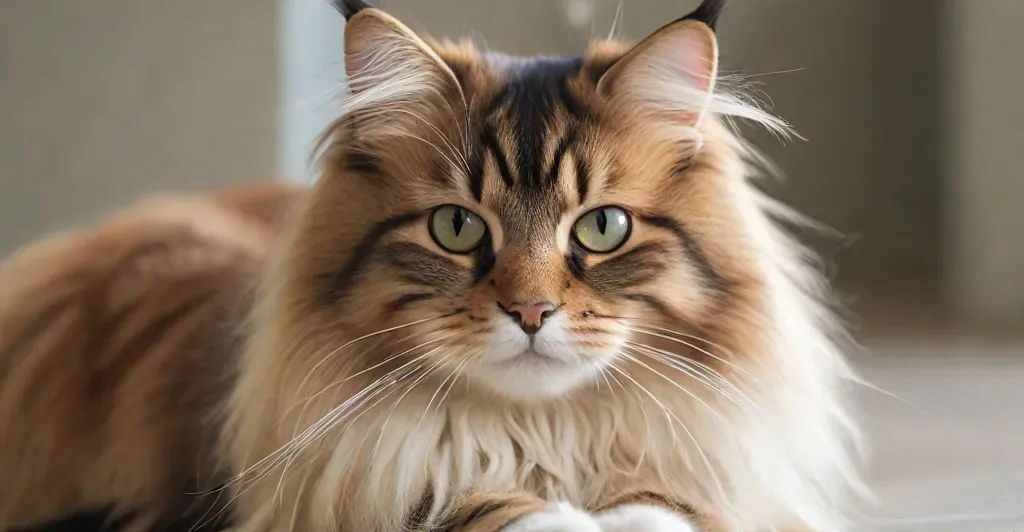
Living with Domestic Long Haired Cats
Suitable Living Environment
These cats can live in apartments or houses. They need space to play and explore but also enjoy cozy spots for naps.
Interaction with Other Pets
Domestic long haired cats usually get along with other pets if they are introduced slowly. Socialize them from a young age to help them get along with dogs and other cats.
Common Health Issues in Domestic Long Haired Cats
Hairballs
Because of their long fur, hairballs are common. Regular grooming and a diet that helps digestion can reduce hairballs.
Dental Problems
These cats can have dental issues like gingivitis. Brush their teeth regularly and schedule dental check-ups with the vet.
Genetic Disorders
Some breeds, like Persians, can have genetic issues like breathing problems. Regular vet visits can help manage these problems.
Grooming Tips for Domestic Long Haired Cats
Brushing Techniques
Use a special comb or brush for long haired cats. Brush from their head down to avoid hurting their skin. Focus on areas that easily get tangled, like behind the ears and under the legs.
Bathing Tips
Bathe your cat occasionally with a cat-safe shampoo. Rinse well to avoid leaving any residue that can irritate their skin.
Dealing with Mats and Tangles
If you find mats, gently work them out with a comb. If they are severe, you may need to cut them out or see a professional groomer.
Feeding Tips for Domestic Long Haired Cats
Recommended Diet
Give them high-quality cat food suited to their age and health needs. Wet food can help keep them hydrated, and dry food can help with their teeth.
Foods to Avoid
Avoid feeding them human food, especially toxic items like chocolate, onions, and garlic. Ask your vet for a list of foods to avoid.
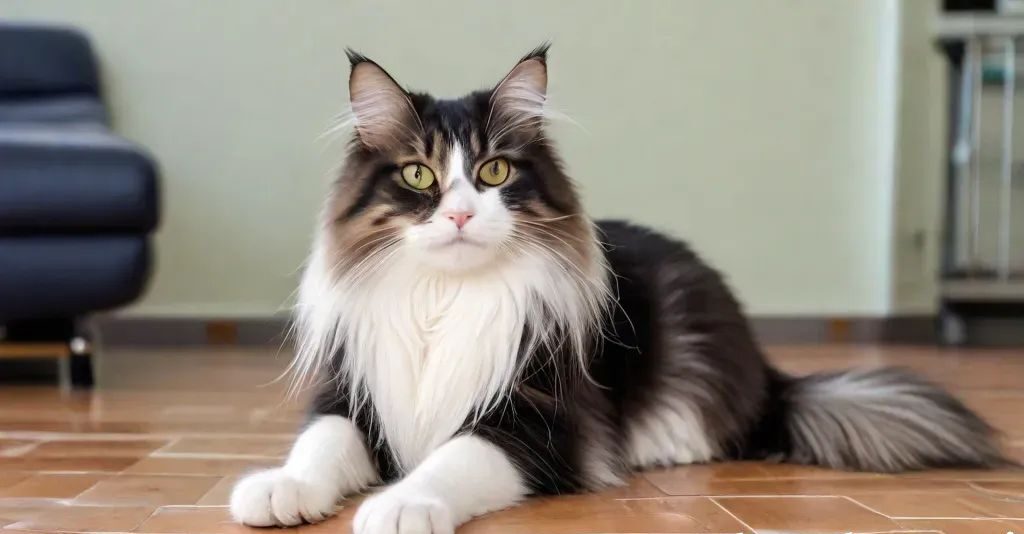
Training Domestic Long Haired Cats
Litter Training
Start litter training when they are young. Keep the litter box clean and in a quiet place. Use positive reinforcement to encourage them.
Behavioral Training
Be consistent and use treats and praise to reward good behavior. Avoid punishment as it can make them fearful or aggressive.
Adoption and Rescue of Domestic Long Haired Cats
Where to Adopt
Look for reputable shelters and rescue groups. Some breeds have specific rescue organizations. Adoption is a great way to give a cat a loving home.
What to Look for in a Shelter
Choose a shelter that provides good care and has a clean environment. Ask about the cat’s health and behavior to find a good match for your home.
Fun Facts About Domestic Long Haired Cats
Unique Traits
- Some have “tufted” ears and paws that make them look wild.
- They often have a “lion’s mane” of fur around their neck.
Famous Long Haired Cats
- Grumpy Cat, known for her unique look, was part domestic long haired cat.
- Maru, a Scottish Fold, is famous on YouTube for loving boxes.
Myths and Misconceptions About Domestic Long Haired Cats
Shedding Myths
Personality Misconceptions
Not all long haired cats are aloof or high-maintenance. Many are loving and enjoy human company.
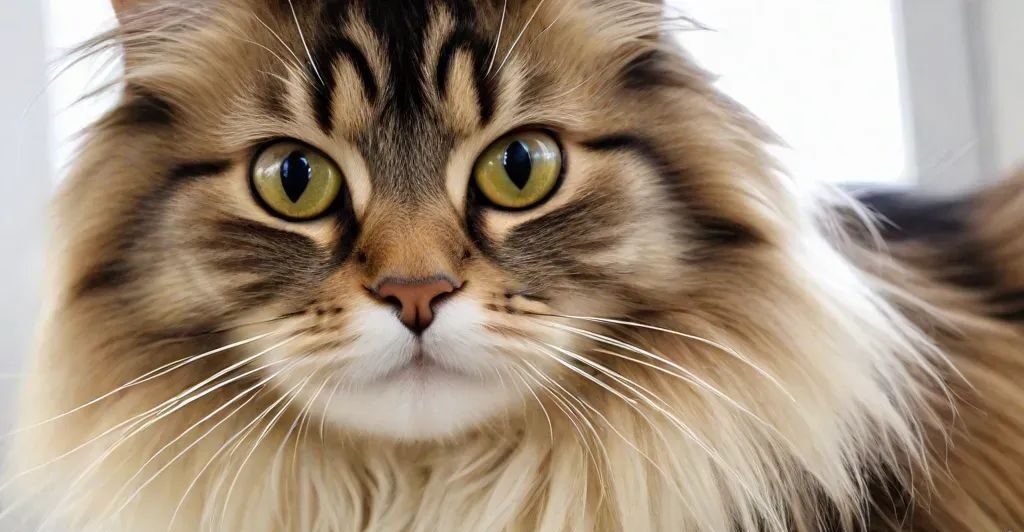
Why Choose a Domestic Long Haired Cat?
Benefits of Owning One
They are beautiful, loving, and often have charming personalities. They make great companions and can be very soothing.
Ideal Owners
People who enjoy grooming and have time to care for them. They are great for families, singles, and seniors.
Preparing Your Home for a Domestic Long Haired Cat
Essential Supplies
- Litter box and litter
- High-quality cat food and water dishes
- Grooming tools
- Scratching posts and toys
Safe Spaces
Provide quiet, cozy spots for them to relax. This can be a cat bed, a perch by a window, or a hidden corner.
How Long Do Domestic Long Hair Cats Live?
Average Lifespan
Domestic long hair cats usually live between 12 to 15 years. With good care, some can even live into their early 20s.
What Affects Their Lifespan?
Here are some things that can impact how long your cat lives:
- Diet: Feeding them the right food helps keep them healthy.
- Exercise: Playing with them keeps them active and fit.
- Healthcare: Regular vet visits and vaccinations help prevent diseases.
- Home Environment: A comfortable and safe home is important for their well-being.
Tips for a Longer Life
- Vet Check-Ups: Take your cat to the vet once a year to catch any health issues early.
- Good Food: Give them high-quality food that’s right for their age and health.
- Water: Always provide fresh water and consider wet food to keep them hydrated.
- Grooming: Brush them regularly to reduce shedding and hairballs.
Taking care of these things can help your domestic long hair cat live a long and happy life.
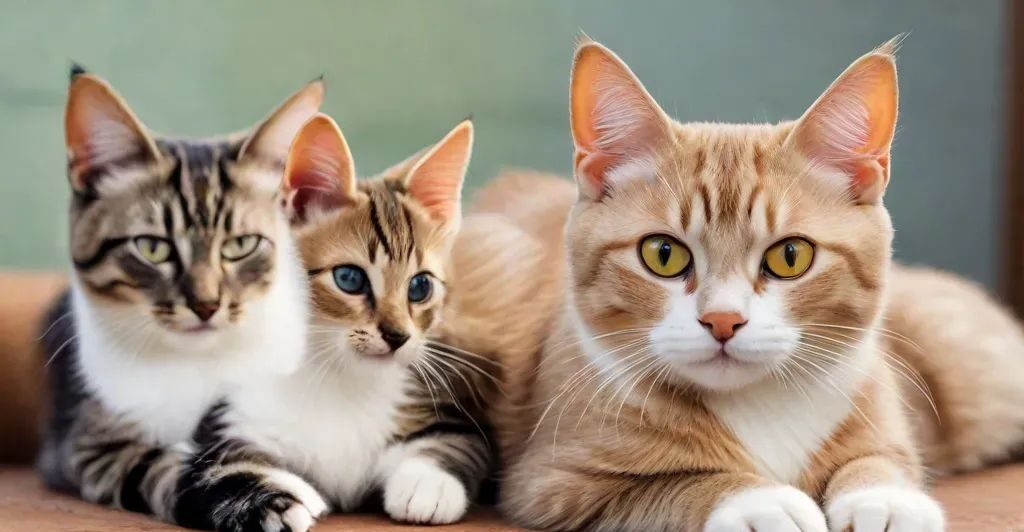
How Long Do Domestic Short Hair Cats Live?
Average Lifespan
Domestic short hair cats usually live between 12 to 16 years. With good care, some can even reach their early 20s.
What Affects Their Lifespan?
Here are some things that can impact how long your cat lives:
- Diet: Feeding them good, balanced food keeps them healthy.
- Exercise: Playing with them helps them stay active.
- Healthcare: Regular vet visits and vaccinations help prevent diseases.
- Home Environment: A safe and comfy home is important for their well-being.
Tips for a Longer Life
- Vet Visits: Take your cat to the vet once a year to check their health.
- Good Food: Give them high-quality food that’s right for their age and health.
- Water: Always provide fresh water and consider giving wet food to keep them hydrated.
- Grooming: Brush them regularly to help with shedding and hairballs.
Following these tips can help your domestic short hair cat live a long and happy life.
Do Domestic Long Hair Cats Shed?
Yes, They Do
Domestic long hair cats do shed. Because of their long, thick fur, they leave more hair around the house than short-haired cats.
Why Do They Shed?
- Seasonal Changes: Cats shed more in spring and fall to adjust to the weather.
- Health: Normal shedding is okay, but too much could mean there’s a health problem.
How to Manage Shedding
- Regular Brushing: Brush your cat a few times a week to reduce loose fur and prevent tangles.
- Healthy Diet: Give your cat a balanced diet to keep their fur healthy.
- Grooming: Regular grooming helps control shedding and keeps their coat looking nice.
With proper care, you can manage the shedding and keep your home cleaner.
Are Domestic Long Hair Cats Hypoallergenic?
No, domestic long hair cats are not hypoallergenic. This means they can still cause allergies. No cat is truly hypoallergenic because all cats produce a protein called Fel d 1 that causes allergies.
How to Reduce Allergies from Cats
- Brush Your Cat: Regular brushing can help remove loose fur and reduce allergens.
- Clean Your Home: Vacuuming and dusting often can help keep allergens away.
- Use Air Purifiers: Air purifiers with HEPA filters can help clean the air.
- Create Cat-Free Zones: Keep some areas of your home, like your bedroom, free of cats to reduce allergens.
Cats That Might Be Better for Allergy Sufferers
Some cats might cause fewer allergies, including:
- Siberian
- Balinese
- Bengal
- Russian Blue
But remember, everyone’s allergies are different.
Talk to a Doctor
If you have cat allergies but still want a cat, talk to a doctor. They can give you advice and maybe treatments to help manage your allergies.
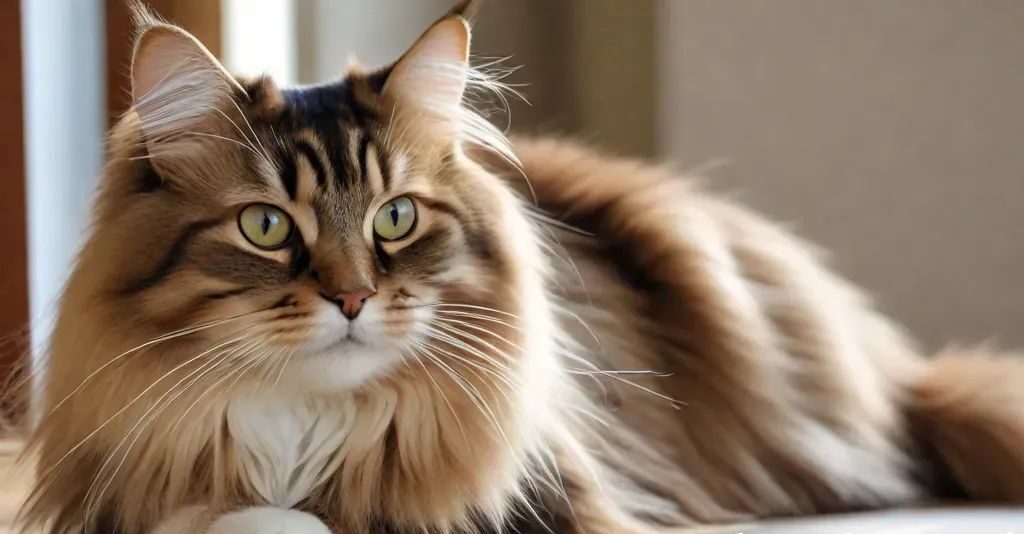
Final Thoughts: Domestic Longhair cat

I am a dedicated writer and expert in cats, with years of experience studying feline behavior, health, and breeds. Passionate about sharing my knowledge, I provide valuable insights and practical advice to help cat lovers understand and care for their furry companions. When not writing, I enjoy spending time with my beloved cats, continually learning and deepening my expertise.
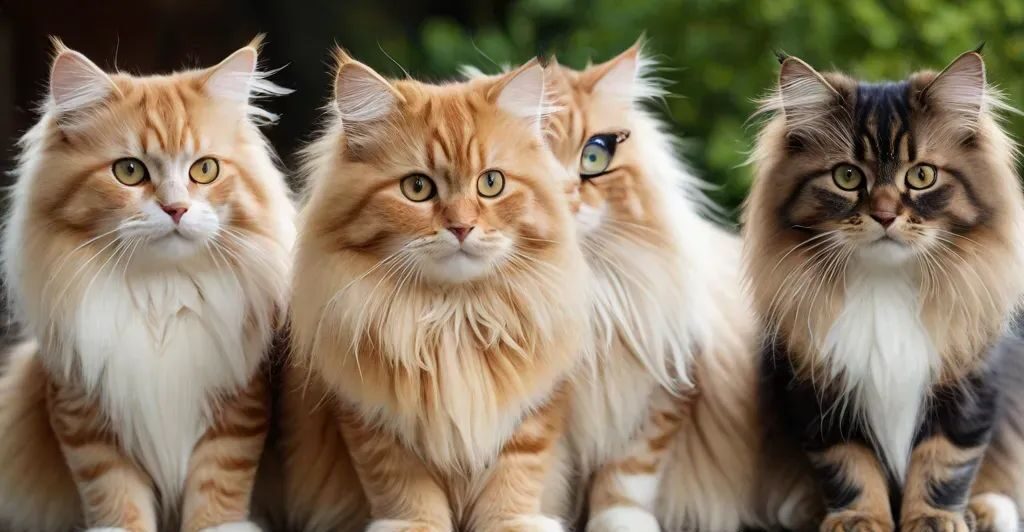
Leave a Reply